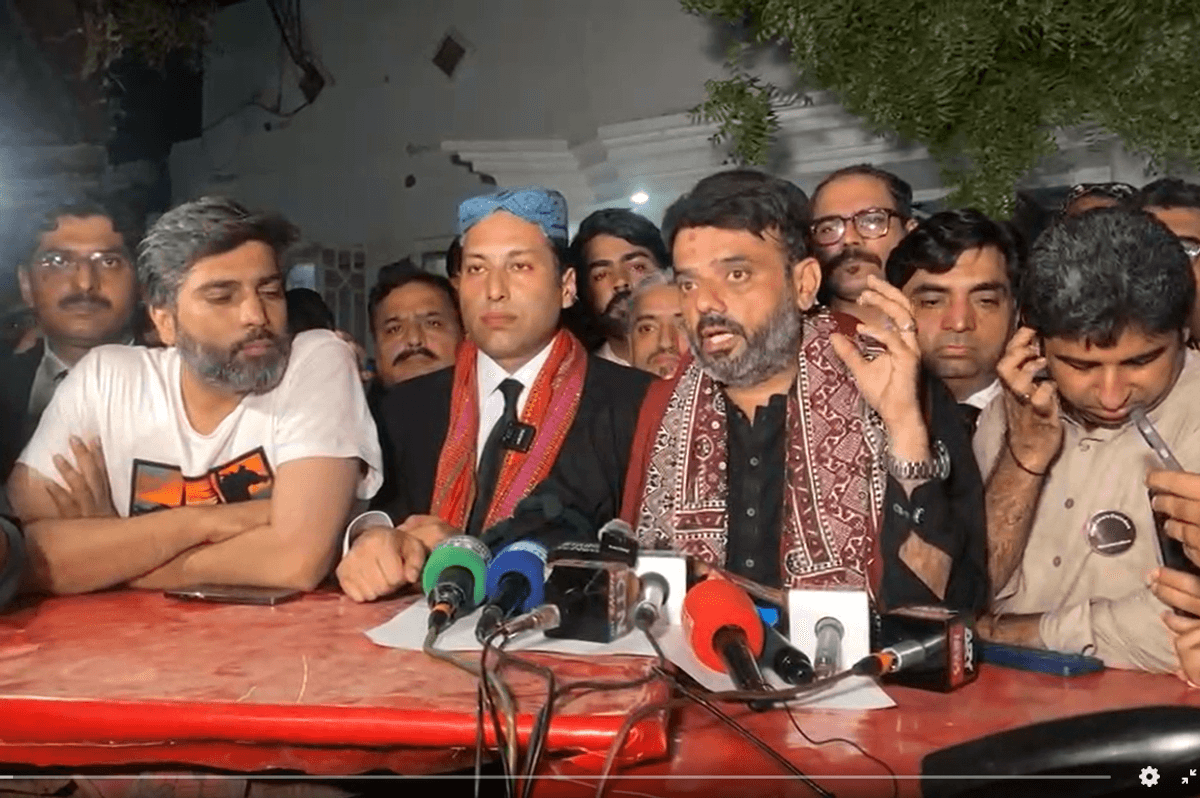Lawyers end sit-in after Pakistan halts controversial canal projects
Lawyers in Sindh province also demanded cancellation of corporate farming leases, with talks set to continue on May 13
Akhtiar Khokhar
Special Correspondent
Akhtiar Khokhar is a one of the karachi-based senior journalists. He has been doing investigative reporting for Pakistan's mainstream print and electronic media for the past 33 years, especially highlighting corruption and bad governance in government institutions and development projects.

Leaders of Lawyers’ Action Committee during a press conference.
Courtesy: Times of Sukkur
Lawyers in Pakistan's southern Sindh province on Tuesday ended a nearly two-week-long sit-in protest on National Highway near Sukkur after the federal government agreed to halt new canal construction on the Indus River.
The protest, led by the Lawyers’ Action Committee, had blocked goods transport between Sindh and Punjab provinces since April 18. The protest was supported by various political and social organizations and took place at Baberlo, a key point on the National Highway.
At a press conference, leaders of the committee, including Karachi Bar Association President Amir Nawaz Warraich and High Court Bar Association President Sarfaraz Maitlo, announced the end of the protest.
The decision came a day after a meeting of the Council of Common Interests (CCI), chaired by the Prime Minister, resolved to suspend the controversial canal projects on the Indus River.
"This was our primary demand, and we welcome its acceptance," said Maitlo.
The lawyers also demanded cancellation of agricultural land leases granted to the Green Pakistan Initiative, a company involved in corporate farming. This demand, they said, falls under the jurisdiction of the Sindh provincial government.
Sindh’s Home Minister Zia Lanjar met with the protest leaders and assured them that new leases had been suspended. He also promised that details of the current land leases would be shared with the Lawyers’ Action Committee by May 6.
"We will review the lease documents and hold talks with the Sindh government representatives on May 13," Warraich said.
He warned that if negotiations with the Sindh government fail, the committee will consider launching a new phase of protest.
The leaders thanked participants and supporters, calling the Baberlo sit-in a success.
Canal project freeze
In response to the escalating crisis, Prime Minister Shehbaz Sharif on Monday chaired an emergency session of the Council of Common Interests (CCI), Pakistan’s top constitutional forum for resolving disputes between the federation and provinces.
According to an official statement, the CCI paused plans for new canals and decided that no future canal projects will proceed without unanimous agreement among the provinces.
“The federal government will not construct any new canals without mutual understanding,” the statement read, adding that a national, consensus-based roadmap for agricultural development and water management will be developed in consultation with all provincial governments.
Controversial project
The federal government’s original plans included six new canals -- five on the Indus River and one on the Sutlej River. These were: the Rainee and Thar Canals in Sindh, the Kacchi Canal in Balochistan, the Chashma Right Bank Canal in Khyber Pakhtunkhwa, and the Cholistan and Greater Thal Canals in Punjab.
Three of these -- Rainee, Kacchi, and Chashma Right Bank -- have been under construction since the early 2000s, predating the current dispute. However, they have long drawn criticism from water experts and civil society in Sindh, who argue that further canal development could exacerbate water scarcity and environmental degradation, particularly in the already fragile Indus Delta.
These projects are part of the Pakistan Green Initiative, which aims to expand corporate farming nationwide through public-private partnerships.
According to the 1991 Indus River System Accord, any new irrigation project must be approved by IRSA. Earlier this year, IRSA issued a certificate clearing the Cholistan Canal, but Sindh’s representative Ehsan Laghari opposed it, warning of potential harm to Sindh’s water rights. While Punjab maintains that the Cholistan Canal would use its existing share of water, Sindh argues that Punjab has not clarified which regions would sacrifice water to make this possible.
This lack of clarity has heightened fears that water meant for Sindh could be diverted to irrigate new farmland in Cholistan. Experts warn that such diversions could further reduce freshwater flow into the sea, devastating the coastal ecology and threatening the livelihoods of thousands who depend on the Indus Delta.







Comments
See what people are discussing